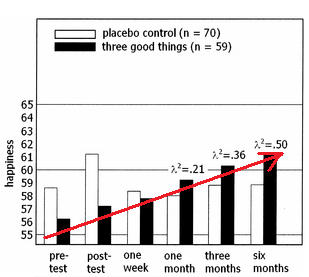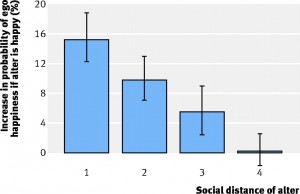There might be affiliate links on this page, which means we get a small commission of anything you buy. As an Amazon Associate we earn from qualifying purchases. Please do your own research before making any online purchase.
Last week, I declared June the Month of Happiness.
I decided to post one article every weekday, each containing a practical idea that you can apply to become happier, immediately.
We talked about psychostimulants, laughter, gratitude, fake smiles, and making happy friends. I'm sure you'll find at least one article that fits your interests, personality, and situation.
Day 1: Psychostimulants: They Might Give You Happiness; They Might Give You a Heart Attack

Psychostimulant: an agent with antidepressant or mood-elevating properties.
Think I'm talking about Adderall or crack cocaine? Nope – what I'm talking about … you probably take a hit of at least once a day.
Coffee is your crack. At least I hope so. If you're using crack, I recommend switching to coffee. It's a bit safer.
Coffee is a psychostimulant – a class of drugs that have been proven to improve mood. That's why certain psychostimulants, like Adderall, are used to treat depression34.
But dealing with drugs is never simple. These drugs, coffee included, are widely abused – we like feeling good and we can't help but consume more. Taking too much at the wrong time can produce negative effects; not the least of which are anxiety and heart failure. Because you're addicted, you may not notice – or even care (I'm talking about the anxiety; I'm hoping you'd notice the heart failure). Benefiting from a psychostimulant is not as simple as something like exercise, where more = better.
That's why we're going to take a closer look at two in particular: Coffee, which you're all probably familiar with, and a possible amplifier or substitute, Cold Showers.
Read the rest of the article here.
Day 2: How to Harness the Power of Laughter: An Easy, Effective, and Infinite Source of Joy
“If you want to be more happy, you should laugh more. The fastest way to laugh more is to just laugh.” -Amit Amin
Laughter is one of life's most amazing gifts.
- It vaporizes stress – lowering levels of cortisol and epinephrine.1
- It increases our pain threshold – watching just 15 minutes of comedy makes us 10% more resistant to pain.2
- It improves our immunity and fights off disease – watching 60 minutes of comedy increases the volume and activity of our immune cells.3
- Its mere anticipation immediately improves mood, reduces pain, and boosts our immune system. Yes, that's right – just anticipating future laughter increases endorphin levels by 27%, and human growth hormone levels by 87%.4
It does much more, like improving blood flow and memory, but what this post focuses on is the stress reduction and mood elevation.
Our biology often hijacks our body for its own purposes.
It makes us crave food when we're trying to diet; it makes us cheat on our spouse even though we love them; it makes us read useless blogs like this one when we should be working; it makes us watch TV even though we want to exercise.
Now it's our turn.
Read the rest of the article here.
Day 3: Three Good Things, A Small Gratitude Exercise for a Large Boost of Happiness

You can increase your long-term happiness by almost 10% with a simple, fun and free 5 minute exercise.1
Here's the exercise: ” Write down three things that went well each day and their causes every night for one week. In addition, provide a causal explanation for each good thing.”
That's it. We spend tens of thousands of dollars on expensive electronics, homes, automobiles and vacations hoping for a 10% boost. There is a free alternative, and it works.
In a study of exercise's effectiveness by Martin Seligman, participants were asked to follow those exact instructions for just one week.
After one week they were 2% happier than before, but in follow-up tests, their happiness kept on increasing, from 5% at one month, to 9% at six months. All this, even though they were only instructed to journal for one week. Participants enjoyed the exercise so much, that they just kept on doing it on their own.
I tried it for myself – I set a goal of doing it for just one week.
It's addictively effective.
Read the rest of the article here.
Day 4: The Right Way to Fake a Smile For Health and Happiness

I use to fake smiles and pretend I wasn't upset or anxious. The result wan't pretty – I felt worse for longer and developed psychosomatic symptoms like irritable bowl syndrome and sciatica.
The science replicates my experience; the NYT wrote an analysis of a relevant research study. The headline: “A Fake Smile Can be Bad for Your Health.”
Freudian psychotherapists would agree, believing that repressing one's negative emotions can cause mental illness.
On the other side, we have legions of self-help gurus and positive psychologists like Sonja Lyubomirsky (of the How of Happiness) telling us that we should, “act like a happy person” even when we're unhappy.
So which is it? Which side is right, and which should we do?
Should we be fake or authentic?
Neither – that's the wrong question. The reason there is so much disagreement on the subject is because the two sides are talking about different things.
Four different things, in fact:
- Repressing negative thoughts and feelings.
- Faking your body signals, like your posture and facial muscles.
- Changing your thoughts to be more positive and optimistic.
- Self-generating positive emotion.
Repression is bad; the rest are good.
Read the rest of the article here.
Day 5: The Power of Emotional Contagion: 5 Ways to Get Your Environment to Work for You

Emotions are contagious. Scientists are still debating the how and why, but we all know this intuitively. When we talk to someone sad, we tend to get depressed ourselves. When we talk to someone filled with joy, we just can’t help but feel a little better.
A long-term network study of 4,739 connected individuals put numbers to our intuition:
You are 15% more likely to be happy if a directly connected friend is happy, 9.8% more likely if a friend of a friend is happy, and 5.6% if a friend of a friend of a friend is happy.1
That’s right – a friend of a friend of a friend, someone you don’t even know, has more influence on your happiness than the size of your TV.
This was shown to be true after controlling for all sorts of confounding factors. Your friend of a friend of a friend actually influences your friend’s friend, who in turn influences your friend, who finally influences you.
So how can we take advantage of the biological fact that much of our mood comes from our environment?
You should spend less time with negative people. But you’ve probably already had someone tell you that already. Instead, I suggest that you spend more time with happy people.
Read the rest of the article here.
Leave me a comment if you'd like me to explore a certain idea or area in the weeks to come, or if you'd like to contribute an article yourself!
I'd also like to share two things which happened this week.
First, I nearly killed my brain 🙂
Imagine that you are back in school and have just been assigned the standard 5 page paper. Now imagine that:
- You haven't actually learnt the material yet.
- You've only been given one day to do both, learn the material and write the paper.
- Other people besides the teacher will be reading the paper – in other words, you need to make it interesting.
That was my experience the past five days. This week was more mentally challenging than any before it. I'm glad I decided not to pursue my masters – I learnt more in five days of blogging than I would have in weeks of schooling.
Second, I realized I was over-prescribing and under-analyzing.
Every one of you is different. That means that different ideas will be more or less useful depending on who you are.
My goal with this blog is to provide a level of quality and depth which cannot be found elsewhere. Posting once every weekday makes that impossible. Therefore, every person who comments on at least five of the Month of Happiness posts by the end of the month will receive a free copy of my upcoming eBook, which will give each idea the full analysis it deserves.

This is a wonderful start to your month of happiness! I especially appreciated the caffeine/cold water article, and the journal of good things that happened each day. Thanks for the laughter, and the happy-thoughts!
I’m glad I was able to transmit some of the laughter and happy thoughts!
If you were following along with me, you missed out on 4 minutes of laughter. I suspect, however, that you were silently sitting in your chair thinking I’m a madman, so no, you didn’t miss anything 😉
A discipline? Nothing so formal. I recognize the massive benefits of laughter… so I laugh 🙂
Hey Amit, I gotta say I love your commitment to your mission of quality and depth. That is all… 🙂 Looking forward to week 2!
Laughter is one of life’s most amazing gifts.
so true!
Awesome video, I was laughing right long with you!